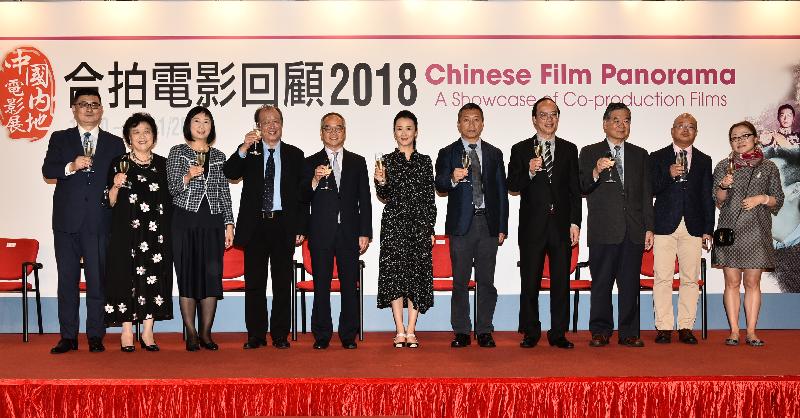Chinese Film Panorama – A Showcase of Co-production Films 2018 opens tonight (with photos)
An opening ceremony for the Chinese Film Panorama – A Showcase of Co-production Films 2018 was held tonight (October 18) at Hong Kong City Hall, followed by the screening of the opening film “Where Has Time Gone?” (2017), a collaboration between Chinese director Jia Zhangke and filmmakers from Brazil, Russia, India and South Africa.
Showcasing 12 outstanding films co-produced by the Mainland and Hong Kong or foreign countries, the programme is jointly presented by the Leisure and Cultural Services Department and the South China Film Industry Workers Union in association with Sil-Metropole Organisation Ltd, Southern Film Co Ltd and the China Film Foundation. The films will be screened from today until November 30 at the Theatre of Hong Kong City Hall and the lecture halls of the Hong Kong Space Museum and the Hong Kong Science Museum.
Speaking at the opening ceremony, the Secretary for Home Affairs, Mr Lau Kong-wah, noted that the co-production films have witnessed the continuing exchanges between China and the rest of the world and also signify the progress made by Chinese films to “go global”. Through these films audiences can gain a better understanding of the cultural interactions between various places, he added.
Other officiating guests at the opening ceremony included Deputy Director-General of the Publicity, Culture and Sports Department of the Liaison Office of the Central People’s Government in the Hong Kong Special Administrative Region Mr Zhu Ting; leader of the Chinese film delegation Mr Li Qiankuan; the Director of Leisure and Cultural Services, Ms Michelle Li; the Chairman of the Hong Kong Film Development Council, Mr Ma Fung-kwok; the Chairman of the South China Film Industry Workers Union, Mr Yu Luen; and the Chairman of Sil-Metropole Organisation Ltd, Mr Chen Yiqi.
The opening film, “Where Has Time Gone?”, is the first co-production involving the BRICS countries. It consists of five short films made by the five directors using different angles to present the passage of time. The film won the “Golden Silkroad” Media Honor Special Jury Award at the 4th Silk Road International Film Festival.
Other selected films include “Pali Road” (2016) directed by Jonathan Lim, “Miss Granny” (2015) directed by Leste Chen, “Wolf Totem” (2015) directed by Jean-Jacques Annaud, “The Nightingale” (2014) directed by Philippe Muyl, “A Wedding Invitation” (2013) directed by Oh Kihwan, “Aftershock” (2010) directed by Feng Xiaogang,”Hanoi, Hanoi” (2006) directed by Zhang Jing, Li Wei and Yan Junyong, “Zhou Yu’s Train” (2003) directed by Sun Zhou,”Red Rose White Rose” (1994) directed by Stanley Kwan, “The Last Emperor” (1987) directed by Bernardo Bertolucci and “The Go Masters” (1982) directed by Duan Jishun and Junya Sato.
“Where Has Time Gone?” is in Portuguese, Russian, Hindi, English and Putonghua; “Pali Road” and “The Last Emperor” are in English and Putonghua; “Hanoi, Hanoi” is in Vietnamese and Putonghua; “The Go Masters” is in Japanese and Putonghua while the other films are in Putonghua. All films have Chinese and English subtitles. “Red Rose White Rose” is classified as Category III, only persons aged 18 and above will be admitted.
Tickets priced at $55 are now available at URBTIX (www.urbtix.hk). For credit card telephone bookings, please call 2111 5999. For programme enquiries, please call 2734 2900 or visit www.lcsd.gov.hk/fp/en_US/web/fpo/programmes/2018cfp/index.html.




